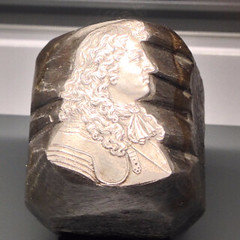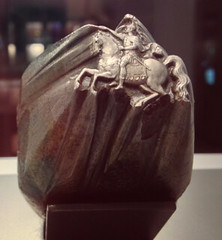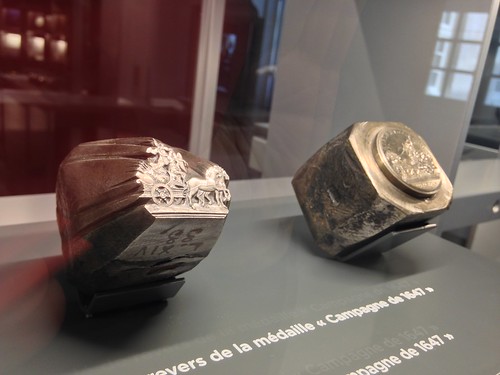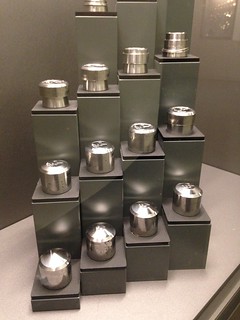
PREV ARTICLE
NEXT ARTICLE
FULL ISSUE
PREV FULL ISSUE
A VISIT TO THE PARIS MINT MUSEUMGary Beals of Segovia, Spain recently visited the updated Paris Mint Museum and filed this report. Thanks! Great images. The first one shows the steps of the die making process.
-Editor
The Paris Mint Museum — Monnaie de Paris — has re-opened after a major restoration from 2011 to 2017 with impressive results. Just a short walk along the Seine from the Notre Dame Cathedral, it is well worth a visit, with 10€ admission.   Ever since 1775, this mint in the heart of Paris, has struck gold and silver coins. Today’s euro coins are produced at a huge new mint in southwestern France. Two large modern presses remain at this mint to produce specialty items. Some of its rooms are actually vaults with massive doors to protect the variety of numismatic items collected from around the world. Old fly presses, panographic lathes and other devices are well displayed. I was particularly struck by the artistry of the hubs, those substantial punches used in making dies for coins and medals two or three centuries ago. So much so, I am working on a article on that particular aspect of coining history. I was impressed with a display of dies tracing the 14 steps taken as a hub or master die is gradually impressed into a die blank — with starts with a conical face! Note the blank die in the lower left of the photo. The historical hubs were amazing. Chunks of steel the size of yams were carved down to just a particular image to be punched into a die. The images at the pointy end of the heavy punch is a
perfect representation of a 17th century horse and rider, king or other figure.  The mint’s website will tell you in just slightly fractured English: “those coins are manufactured with the same rigor and quality according to the rules of French excellence. Thanks to their state-of-the-art know-how, our creative craftsmen shape medals, awards, decorations, castings and jewelry.” The website only briefly “From the metals transformation to the finished products, these steps will guide the public to the crafts, and to the Monnaie de Paris’ historical collections, which for the most part, never had been disclosed before. These factory activities in the very heart of Paris reveal: casting, striking, die cutting as well as engraving, chiseling and gilding. “The Grand Monnayage and the Petits Monnayages will return to their initial purpose: striking coins and medals. Seven modern presses in the Grand Monnayage and six in the lateral coin striking rooms allow the visitors to see the medals and coins made before their eyes.” Well, at least from a distance, and not on the weekends, it would seem. (I was there on a Saturday just as it opened at 11 a.m.) “Having precisely calibrated their machine, the minters check the quality of the strike between each pass. They must detect the slightest flaw with the naked eye, understanding how the metal rises in relation to the desired relief. The air in the press is filtered and pressurized to eliminate anything which could give the coins a grainy surface. The struck motif must be perfect! The minter's craft requires a lengthy training period of about a year, during which seasoned artisans pass on their skills and knowledge.” To read earlier E-Sylum articles, see: Wayne Homren, Editor The Numismatic Bibliomania Society is a non-profit organization promoting numismatic literature. See our web site at coinbooks.org. To submit items for publication in The E-Sylum, write to the Editor at this address: whomren@gmail.com To subscribe go to: https://my.binhost.com/lists/listinfo/esylum All Rights Reserved. NBS Home Page Contact the NBS webmaster 
|
